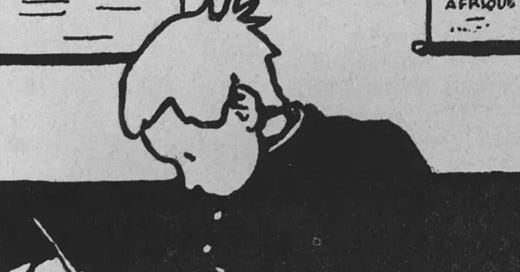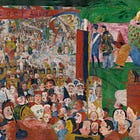
A while ago, my father mentioned something he had noticed while reading Croatian newspapers online. Idioms were being borrowed from English which made little sense. He suspected writers were cheating with the help of Google Translate by copying and pasting articles from English, introducing awkward phrases into Croatian, and lowering the quality of writing overall. He definitely had a few convincing examples to back up his observation.
Because content often goes downstream from English to other languages, the laziest option tends to win. For the non-English speaking world, the first injury to writing by machines arguably came from Google Translate. If you’re from a smaller nation, this is especially true.
Still, these are relatively minor problems. More pressing is the coming avalanche of artificially-generated writing and art, which has provoked some soul-searching on what will become of it all. Off the top of my head, a few examples come to mind: magazines ending open calls due to being flooded with generated submissions; students relying on ChatGPT to write their entire essays; AI-made television scripts potentially replacing striking screenwriters; Spotify being overloaded with fake songs and fake listeners; and the list goes on.
Coincidentally, as I was writing this, it has been a big week for artificial intelligence. Tech CEOs have been flocking to Washington to demand they “regulate AI” because of the potential for an “extinction-level event.”
Many people are understandably not happy about recent developments. Whereas it was initially hoped AI would replace tedious and repetitive physical tasks, thereby leaving humans to find fulfillment in their leisure and creativity, the short-term may very well end up being the opposite.1 Like some bad joke, humans are being left with the same long working hours, as robots draw, write poetry, and take over creative work.2 While the trajectory has gone counter to popular expectations, it is nonetheless the next logical step and path of least resistance.
Maybe the doomsayers are right—maybe the internet by the decade’s end will be unrecognizable. AI has the potential to flood the internet with endless keyword-stuffed articles, content sludge, and deepfakes produced en masse at virtually no cost. Browsing the web would then be unbearable as everything would be vying for your attention in an artificial race to the bottom.
But even if this worst-case scenario plays out, AI luckily still fails in one critical aspect: it struggles with understanding context and the open-ended nuances of storytelling. Specifically, I’m thinking of the novel. I would like to briefly make a case for why the novel is something uniquely ours.
The World Hidden from Artificial Intelligence
Understanding best happens when we have a direct point of comparison. Luckily, the rise of AI provides us with a unique moment to reassess that which sets us apart. The answer is obvious but worth saying outright: unlike machines, we exist in a social world as physical beings.
The novel is a pure expression of this fact because, at its core, it is a meditation on social reality. On the other hand, AI is disembodied and not part of the actual social world. So, it can’t write a great novel, it can only mimic style. This perspective becomes clearer if we consider the sociological and historical origins of the novel and why it became so popular.
By tracing this history, we find that the novel emerged at a particular point in time, as a way to make sense of the individual’s search for meaning in an open-ended world. In fact, this understanding of life has been so embedded in our culture that even if we don’t actively read novels, we still deeply relate to them as an extension of ourselves.
The Origins of the Novel
The popularization of the novel as a form is actually quite recent and deeply intertwined with modern history. Starting from the early 18th century, the forces of capitalism, industrialization, and liberalism were producing a new individualism in a corner of Western Europe. This new individual, uprooted from the countryside, resided in a fast-growing urban setting that lacked firm footing. Writing in 1762, philosopher and novelist Jean-Jeaques Rousseau aptly likened this to a “social whirlwind.”3 The novel emerged as a way of expressing the conflict between the interior of the self and this chaotic world.
This form was a radical departure from pre-modern literature. Epic poetry in Ancient Greece, for example, took as its starting point that the world constituted a closed totality where “life, culture, meaning, action, and social institutions formed a harmonious whole.”4 Similarly, in the later Christian medieval epoch, all life was understood in relation to God as one great connecting chain.5 Medieval prose took the form of romance involving self-contained stories of honor, heroes, supernatural themes, knights, quests, and, of course, love.
The novel, on the other hand, is the story of individuals left to themselves in an environment where “the extensive totality of life is no longer directly given.”6 One has to create meaning on his or her own, as institutions and beliefs become “merely conventional” and no longer natural facts of life.7 Ultimately, the novel is “the story of a degraded search, a search for authentic values in a world itself degraded.”8
[The modern] alienation of the individual from her world leads to a situation of “transcendental homelessness” in which individuals must take up a purely normative stance of a should be towards the world. The novel is always relating to the development of such individuals.9
The novel resonated so strongly because it spoke directly to the new, upending conditions of modern life. This is evidenced by the fact that it caused such a sensation. When Jean-Jeaques Rousseau’s groundbreaking novel Julie; or, The New Heloise was published in 1761, it was a bestseller, unlike anything before it. Adoring fans were overcome with emotion in their letters and begged for the story to be real, because it spoke to their own experiences and search for “inner authenticity.”
Because the novel is about traversing a “degraded” world, György Lukács described it as “an epic of a world that has been abandoned by God.”10 Rather than part of a harmonious whole, the individual is instead “thrown into the world” and must deal with its arbitrariness.11 This is why French writer Honoré de Balzac famously took inspiration from Dante Alighieri’s The Divine Comedy (1321) in naming his multi-volume masterpiece The Human Comedy (1829–48), signaling a new age of self-understanding had started.
But this modern feeling of being “thrown into the world” produced not just disorientation, but also the ability to look soberly at the conditions of others. The novel became the leading vehicle for analyzing the many moving parts of social and political life. George Elliot subtitled her magnum opus Middlemarch (1871-72) as “A Study of Provincial Life.” In Russia, Nikolay Chernyshevsky used the novel to propose a new political vision in What Is to Be Done? (1863) and Fyodor Dostoevsky sought to understand the complex social roots of nihilism in Demons (1871-72). These two novels arguably give you a better feel for 19th-century Russia than a standard history book.
Similar to how painting invented perspective, the development of the novel led to breakthroughs in understanding society. The form spun out in many different ways, interpretations, and writing styles, which have become staples in other mediums. Dostoevsky pioneered the polyphonic form of narration, James Joyce furthered stream-of-consciousness in Ulysses (1922), and so on. In time, the novel form would take over the entire world as writers used it to reflect on the upending and often violent social changes brought by modernity. Each nation created its own canonical literature, made up of novels tailored to its historical-social uniqueness and individual struggle—from Indonesia to Egypt to Brazil.

Today, film, television, and virtually all other media are indebted to the development of the novel and its narrative inventions. Even forms of contemporary writing that are not strictly novels are influenced by the novel form. Really, the story I am telling here is a more general one of art and creative work, and how they came to reflect that fast-changing and sometimes tragic process we loosely call “modernity.”
Novels as Humanism
I write this all to demonstrate that the novel is a historical product that sought to make sense of a world whose natural order was slowly breaking down. It became so popular precisely because it spoke to the actual social conditions of life.
This brings us back to the machines. Because the modern novel as a form is socially embedded, always open-ended and in the process of becoming, it belongs to the realm of humanism, something that’s uniquely ours. A machine has no sense of the state of play of what I’ve just described. Arguably, the novel could end up being one of the few truly human forms left if AI assumes everything else.
You can extend this thinking to much of writing and art more generally, because they are informed by the same realities. Maybe this is a good basis for understanding contemporary humanism and what sets us apart. AI may take over aspects of journalism, marketing, copywriting, and other kinds of writing — but as long as we maintain the will and language to describe our social and inner selves, there will always be an open-ended realm of creation specifically for us alone.
Thanks for reading! If you’re further interested in the topic of modernity, I have written another essay that’s worth checking out:
The economist John Maynard Keynes infamously predicted in 1930 that “his grandkids would work just 15 hours a week.”
Rosseau uses this phrase in Emile, or On Education (1762)
Medieval Christian thought believed in a “great chain of being” that categorized all things in perfect order, an idea that was derived from Aristotle.
The full quote from Lukács’s Theory of the Novel (1916):
“The novel is the epic of an age in which the extensive totality of life is no longer directly given, in which the immanence of meaning of life has become a problem, yet which still thinks in terms of totality.”
Lucien Goldmann, Towards a Sociology of the Novel (1963), pp. 1.
A good summarization of The Theory of the Novel can be found here which also highlights this particular quote.
A term taken from Philosopher Martin Heidegger: “thrownness” or to be born into an arbitrary context.




"I write this all to demonstrate that the novel is a historical product that sought to make sense of a world whose natural order was slowly breaking down."
----------
Indeed, especially in hindsight with the coming of the "First" Industrial Revolution (circa 1760). Also in agreement with your thesis was Stanford literary critic, literary historian, and professor of English Ian Watt per his 1957 book "Rise of the Novel" that traces the rise of the modern novel to philosophical, economic, and social trends & conditions that become prominent in the early 18th century.
The best line (and I really appreciate your footnotes and hat-tips to others, a disappearing practice these days of "stolen valor":) "Like some bad joke, humans are being left with the same long working hours, as robots draw, write poetry, and take over creative work."
REALLY NOT LOOKING FORWARD TO OUR NEW "Artificial Intelligence" (an oxymoron if there ever was one) Transhumanist OVERLORDS ushering in the Fifth Industrial Revolution (5IR) or Industry 5.0 -- brought to you by Klaus Schwab and the World Economic Forum, in which you'll eat the bugs and by 2030 "own nothing and be happy."
If one believes in Jungian collective subconsciousness, or nodes of thought being immortal out 'there," then REVELATION is perhaps real. Build context and one is a receiver. But a MACHINE can never receive revelations.